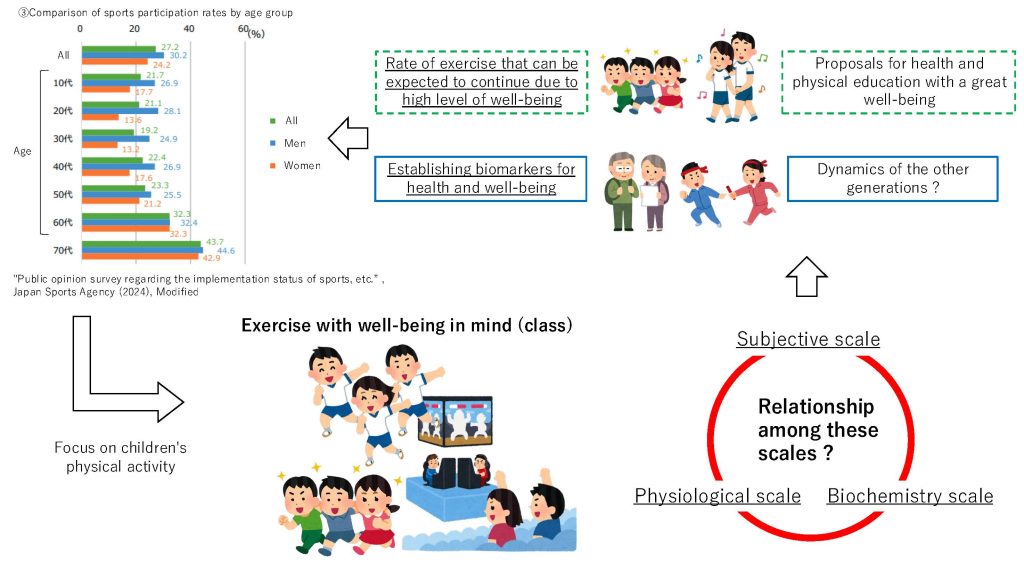Research Center for development of programs that allow all generations to enjoy health and well-being from a physical perspective
Examination of non-invasive biomarkers for various physical activities
The aim of this study is to elucidate the sense of well-being mediated by embodiment, along with its objective aspects using non-invasive biomarkers.
With the remarkable advancement of information technology like the development of metaverse spaces, we have entered a period that questions the manner how our bodies, present since the dawn of humanity, is existed. "exercise" mediated by the body that influence both the mind and body, a privilege unique to humanity. However, there is a problem in the declining rate of physical activity among adults in Japan. To address the problem, attention is directed towards the physical education curriculum in educational scene, which can facilitate a bottom-up approach. Furthermore, as we enter an age heralding concepts of inclusion and well-being, new categories such as "Yuru-sports" have emerged. Despite the various categorizations of physical activities, the fundamental essence of embodiment remains unchanged. Moreover, while the well-being derived from these activities inherently involves embodiment, the correlation with objective biomarkers remains incompletely understood. The unresolved nature of this issue can be attributed to the neglect of a holistic perspective, termed as composite knowledge (Fukugo-chi). This Fukugo-chi is indeed an innovative approach allowing the coexistence of true health and happiness. Thereby This research center will serve as a research base to conduct this in a practical manner.
With the remarkable advancement of information technology like the development of metaverse spaces, we have entered a period that questions the manner how our bodies, present since the dawn of humanity, is existed. "exercise" mediated by the body that influence both the mind and body, a privilege unique to humanity. However, there is a problem in the declining rate of physical activity among adults in Japan. To address the problem, attention is directed towards the physical education curriculum in educational scene, which can facilitate a bottom-up approach. Furthermore, as we enter an age heralding concepts of inclusion and well-being, new categories such as "Yuru-sports" have emerged. Despite the various categorizations of physical activities, the fundamental essence of embodiment remains unchanged. Moreover, while the well-being derived from these activities inherently involves embodiment, the correlation with objective biomarkers remains incompletely understood. The unresolved nature of this issue can be attributed to the neglect of a holistic perspective, termed as composite knowledge (Fukugo-chi). This Fukugo-chi is indeed an innovative approach allowing the coexistence of true health and happiness. Thereby This research center will serve as a research base to conduct this in a practical manner.

-
College of Education
-
College of Education
-
College of Education
-
College of Education
-
University of tsukubaKazuhiro TAKEKOSHI

